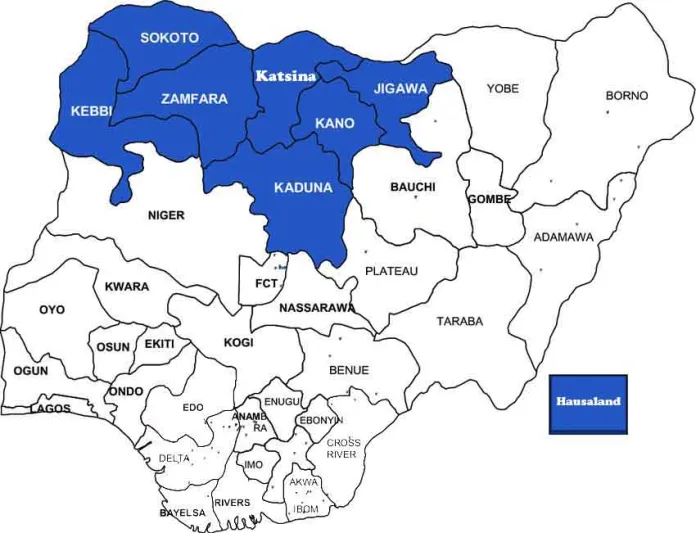Hausa Speaking States in Nigeria: Full List
Hausa is one of Nigeria’s three primary languages; the others being Yoruba and Igbo. The Hausas are native to the northern region of the country. There are certain Northern states in Nigeria which are totally dominated by indigenous Hausa settlers, while in others they make up only a tiny percentage of the population. Nigeria is a country with diverse cultures and languages. The Hausa language is one of the most widely spoken languages in Nigeria. It is spoken by a significant number of people in several states across the country. In this article, we will provide a comprehensive list of all 19 Hausa speaking states in Nigeria.

Map of Hausa Land
Hausa is a Chadic language spoken mainly in Nigeria and some parts of neighboring countries such as Niger, Chad, Cameroon, and Ghana. It is an Afro-Asiatic language and one of the largest ethnic groups in West Africa. Hausa is the second largest language in Africa after Arabic. It is spoken by over 70 million people worldwide.
HISTORY OF HAUSA LANGUAGE
The origin of the Hausa language is unclear, but it is believed to have originated from the ancient city-state of Gobir, located in present-day Sokoto State, Nigeria. The language spread throughout the West African region due to trade and migration. The Hausa people are known for their trading skills and their language has become a lingua franca in West Africa.
Some experts trace the language back to the 7th century, when Arab traders first arrived in the area. As the Arab traders began to establish trade routes across the Sahara, they brought with them their language and culture, which was gradually adopted by the Hausa people. Over time, the language evolved and began to take on its own unique identity, with a distinct grammar, vocabulary, and pronunciation.
By the 19th century, the Hausa language had become a dominant language in the Sokoto Caliphate, one of the largest states in West Africa at the time. It was used as the language of administration, commerce, and education, and played a vital role in the spread of Islam across the region.
The Hausa language has played a significant role in the cultural history of Nigeria, serving as a lingua franca for people from different ethnic and linguistic backgrounds. It has been used in literature, music, and film, and has helped to foster a sense of cultural unity in Nigeria and beyond. The language has also played a vital role in the spread of Islam across West Africa, with many Hausa people embracing the religion and using their language to spread its teachings.
FULL LIST OF HAUSA STATES IN NIGERIA
Here is a full list of all 19 Hausa speaking states in northern Nigeria today
| HAUSA-SPEAKING STATES | CAPITAL |
|---|---|
| Jigawa | Dutse |
| Kaduna | Kaduna |
| Kano | Kano |
| Katsina | Katsina |
| Kebbi | Birnin Kebbi |
| Sokoto | Sokoto |
| Zamfara | Gusau |
| Abuja (FCT) | Abuja |
| Adamawa | Yola |
| Bauchi | Bauchi |
| Borno | Maiduguri |
| Gombe | Gombe |
| Kogi | Lokoja |
| Kwara | Ilorin |
| Nasarawa | Lafia |
| Niger | Minna |
| Plateau | Jos |
| Taraba | Jalingo |
| Yobe | Damaturu |
From the above listed nineteen Hausa states, the following seven states are majorly populated by native Hausa settlers: Jigawa, Kaduna, Kano, Katsina, Kebbi, Sokoto and Zamfara states respectively. Most of the states in the Northern geo-political zone of the country are the poorest states in Nigeria. Although, they boast of having the largest states in terms of land area. The major religion in these Hausa speaking states is Islam, while Christianity is in the minority.
SIZE OF HAUSA LAND
How large is Hausa land when all the states are added together?
The combined area of Jigawa, Kaduna, Kano, Katsina, Kebbi, Sokoto, and Zamfara is roughly 216,029 km2. The total size of the entire Hausaland geographical area will exceed 300,000 km2 if we combine the area of other states with the area of Hausa land itself. This suggests that Hausaland is larger than numerous countries, including Romania (238,391 km2), Ghana (238,540 km2), and Tunisia (163,610 km2).

